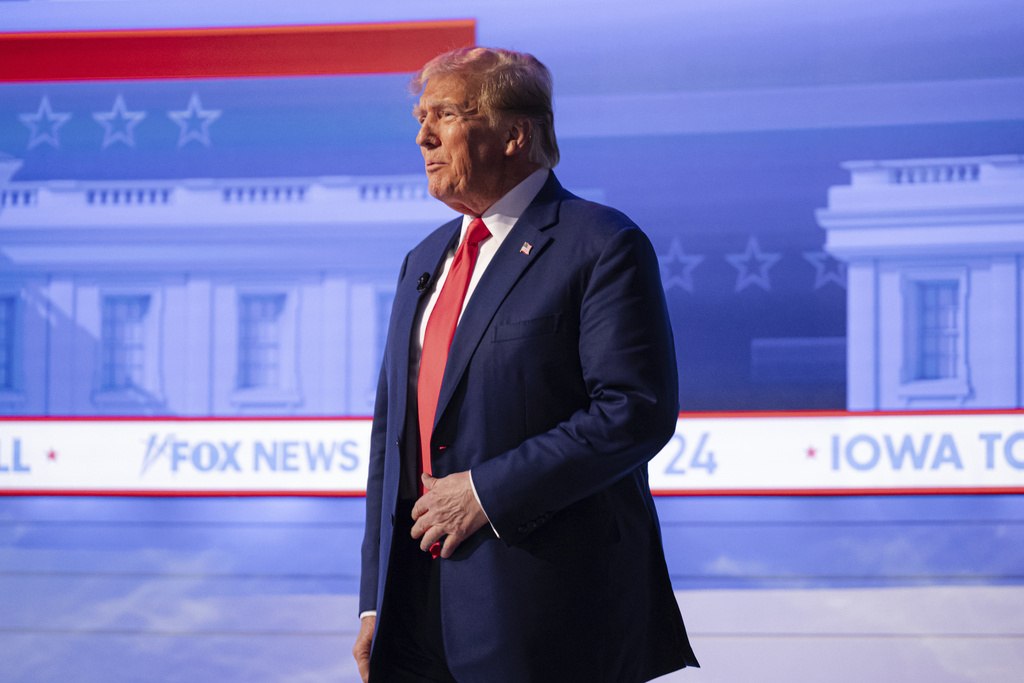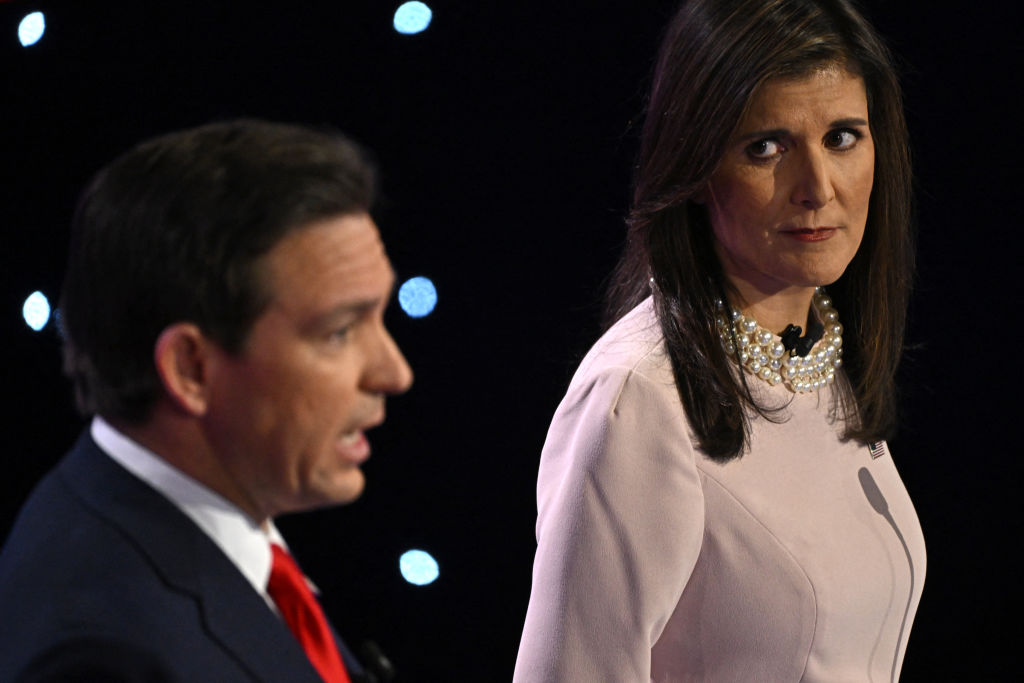
Donald Trump was only two miles away from his leading challengers for the Republican presidential nomination, but they might as well have been worlds apart.
As Florida Governor Ron DeSantis and former U.S. Ambassador to the United Nations Nikki Haley practically slit each other’s throats in a televised debate ahead of the Iowa caucuses, Trump sent a different message to voters: His rivals are barely on his mind.

“I’m not exactly worried about it,” Trump said at a Fox News town hall Wednesday night in downtown Des Moines. Pointing to his dominant polling numbers, the former President mostly eschewed his pugnacious and combative style and pitched himself as above the fray. It’s a strategy at the heart of Trump’s primary bid. By counter-programming all of the Republican debates and avoiding head-to-head confrontations with his chief opponents, Trump has sought to cast himself as the de facto GOP incumbent whose quest to win a third presidential nomination in eight years is all but assured.
But while Trump is leading his closest competitor in Iowa by more than 30 points in most polls, he still made a play to win over whatever undecideds remain in the first-in-the-nation nominating contest. At one point, that entailed undercutting his signature campaign promise of comeuppance. “Hopefully, I won’t have time for retribution,” Trump told one voter. “There won’t be time for retribution. There will be so much success.” At another, he tried to assuage voters’ concerns that a second Trump term would turn the country into an autocracy. “The new narrative is that I’m going to be a dictator,” he said. “I am not going to be a dictator. I am going to manage like we did.” (Trump vowed in December to be a dictator “for one day” and has since doubled down: “Because I want a wall, and I want to drill, drill, drill.”)
Trump only took a few shots at his intra-party challengers. His most vehement critic in the field, former New Jersey Gov. Chris Christie, dropped out of the race hours earlier—a departure that removed Trump’s only GOP opponent willing to call him a threat to American democracy. But Christie wasn’t the target of Trump’s ire Wednesday night. Instead, the former President harped on a viral hot mic moment when Christie was caught saying Haley was “going to get smoked” in the election. “I know very well and I happen to believe that Chris Christie is right,” Trump said. “That’s one of the few things he’s been right about, actually.”
Trump ridiculed DeSantis’s sinking poll numbers and lambasted his one-time ally as disloyal for challenging him. “He’d be working in a pizza shop, or perhaps a law firm, if I didn’t endorse him,” Trump said, referring to his blessing of DeSantis in the 2018 Florida gubernatorial election.
On the other end of town at Drake University, Haley and DeSantis pulled no punches. There was virtually no topic on which the second-tier candidates found their way to respectful conversation. Haley slammed DeSantis on issues like Ukraine—“Nobody knows what he believes”—and the national debt. But she was especially pointed in her attacks on the spending habits of his presidential bid.
“He’s spent more money on private planes than he has on commercials trying to get Iowans to vote for him,” she said, claiming that she flew commercial and stayed in Residence Inns. “If you can’t manage a campaign, how are you going to manage a country?”
Haley directed viewers roughly a dozen times to visit a website her campaign created—DeSantisLies.com—while DeSantis lambasted her as an emblem of “warmed over corporatism.” The Florida governor accused her of trying to raise taxes, described her answers as “word salad,” and suggested that she cared more about Ukraine’s borders than America’s.
“You can take the ambassador out of the United Nations but you can’t take the United Nations out of the ambassador,” DeSantis said.
The two are currently in the middle of a battle for second place, in the hopes of winnowing the field and puncturing the perception of Trump’s invulnerability. If one of them has a strong enough showing and can shrink the margins of Trump’s victory, the thinking goes, they can gain enough momentum in the next primary states to manifest a competitive primary contest.
That’s in large part because Trump is not only fighting on the campaign trail but in the courtroom. He’s facing 91 felony charges across the nation and a $370 million civil fraud trial in New York that could be decided in the coming days.
For even some of Trump’s fans, it’s a concerning predicament. One of the voters who attended Trump’s town hall, Dan Lineman, 62, says he’s undecided about whether he will vote for Trump or Haley. “I love the policies of Trump. I would like to see those kinds of things enacted again,” he said, ticking off Trump’s construction of a border wall and economic stewardship. “But my concern is: Will he be allowed to be able to do that, or will the chaos follow him?”
Lineman’s dilemma reflects what Haley and DeSantis are banking on; their best shot at the nomination may be that enough voters fear putting Trump up as their candidate when he’s facing dire legal peril.
But Trump is determined to give that argument little oxygen. “It’s a witch hunt,” he said, as he set his eyes toward the general election. He told moderators Brett Baier and Martha MacCallum that he already had a running mate in mind. “I can’t tell you that,” he said, “but I know who it’s going to be.”
More Must-Reads From TIME
- The 100 Most Influential People of 2024
- Coco Gauff Is Playing for Herself Now
- Scenes From Pro-Palestinian Encampments Across U.S. Universities
- 6 Compliments That Land Every Time
- If You're Dating Right Now , You're Brave: Column
- The AI That Could Heal a Divided Internet
- Fallout Is a Brilliant Model for the Future of Video Game Adaptations
- Want Weekly Recs on What to Watch, Read, and More? Sign Up for Worth Your Time
Write to Mini Racker at mini.racker@time.com